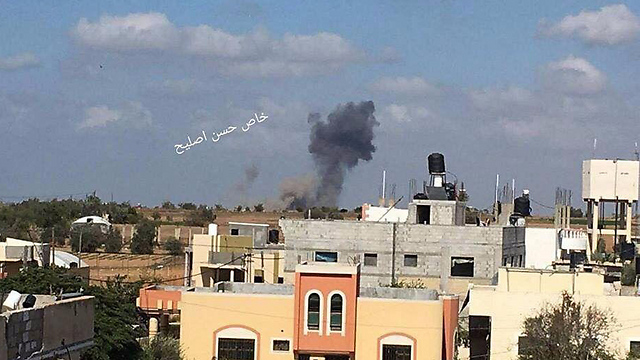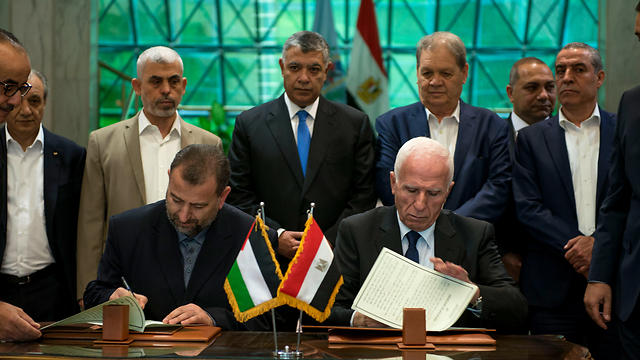

Tunnel explosion puts Palestinian reconciliation to the test
Analysis: If the Islamic Jihad—which isn’t committed to the Fatah-Hamas deal in any way—decides to fire rockets at Israel in response to the tunnel bombing, Hamas won’t be able to stop it. An Israeli response would drag Hamas into the fray, jeopardizing the entire reconciliation process.
On Monday, Israel not only demonstrated its ability to turn the tunnels into cemeteries, but also its ability to bury the Palestinian reconciliation agreement if the basic conditions it is demanding aren’t met. The main condition is demilitarizing the Gaza Strip and handing security responsibility over to the Palestinian Authority, so that Gaza doesn’t turn into Lebanon, and Hamas and the Islamic Jihad don’t turn into Hezbollah.

The preparations to destroy the tunnel took many days. IDF Southern Command, Intelligence Directorate and Air Force units were placed in a state of high alert over the weekend. The IDF prepared both for an offensive and for defensive fighting, in light of the possibility that the tunnel demolition would lead to a counterreaction.
Israel took, and is still taking, into account the possibility that the Islamic Jihad would seek revenge and deterrence, as the organization isn’t committed in any way to the reconciliation agreement signed between Fatah and Hamas. Its weapons can’t be revoked and it can’t be required to stop digging tunnels.
The Islamic Jihad organization is operated and funded by Iran. While Hamas is running out of cash reserves and is forced to reduce its digging pace, the Islamic Jihad has no such problem. It’s a big military organization, and its rocket arsenal is half of Hamas’ arsenal. It’s an organization which can forcibly torpedo any dialogue with the PA or Israel, in accordance with an Iranian decision.
If the Islamic Jihad decides to fire rockets at Israel in response to the tunnel bombing, Hamas won’t be able to stop it from doing so. Hamas, which seeks to reconcile with Iran, won’t clash with the Islamic Jihad, and definitely not over an Israeli attack.
If the Islamic Jihad fires, Israel would respond, and the exchanges of fire that would develop would drag Hamas into the fray. If that happens, the Egyptians may remove their people from the strip and inform the Americans that the dream of a regional reconciliation plan, which the Fatah-Hamas reconciliation is only part, can be shelved.
The Palestinian reconciliation agreement will be put to its first practical test on Wednesday, when Hamas is expected to hand control over the crossings from the strip to the PA, including the Rafah Crossing. As soon as members of the Presidential Guard from Ramallah show up at the Rafah Crossing, they will receive the keys to the dream of every Palestinian in Gaza—opening the road to Egypt for free movement and goods.
A flare-up on the Gaza border could affect the entire reconciliation process. Israel is against the agreement in its current wording, and rightfully so, and Palestinian President Mahmoud Abbas, who knows he won’t have real security control over the strip, would gladly bid farewell to this reconciliation move, which was forced on him by the Egyptians and the Jordanians, as long as he isn’t held accountable for its failure.
Hamas won’t have the tunnel map over to the PA, and the Islamic Jihad definitely won’t do that. Dozens of other organizations in the Gaza Strip aren’t committed to this agreement, from the Democratic Front to the Doghmush family’s armed forces.
Monday’s tunnel demolition made it clear to the PA that the current reconciliation agreement would put it to a daily test vis-à-vis Israel. How will the PA gain responsibility for crossings and borders if it has no control over the tunnels and military forces of the different organizations operating in the area? Every firing incident from the strip is going to immediately lead to a face-off between Abbas’ people and Israel, which will demand that they take responsibility. From this point, the road to a complete severance of ties and a conflict between Israel and the PA isn’t long.
















